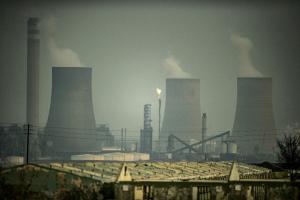Negotiators from 195 nations tasked with crafting a universal climate pact are driven by twin fears tugging in opposite directions, which may result in a hollow deal, say analysts.
The all-too-real prospect of climate catastrophe on a horizon of decades, not centuries, coupled with a rising tide of expectations, would seem to be powerful incentives to forge an agreement that is truly up to the task.
Science makes it clear that the laissez-faire alternative is a climate-addled future of mega-storms, drought, water wars and mass migration.
It is also a reminder that the window of opportunity for acting is barely ajar -- if human emissions of heat-trapping greenhouse gases don't peak very soon and drop very swiftly, it may soon slam shut.
At the same time, however, career diplomats -- and their political bosses -- working on the nitty-gritty of the deal to be inked in Paris in December are haunted by another fear subtly nudging them in the opposite direction: the fear of failure.
"Our concern is that we will end up with a lowest common denominator, where everybody just agrees on the least ambitious options," said Li Shuo of Greenpeace China.
The last time the world tried to craft a "last chance" universal climate pact -- in Copenhagen, in 2009 -- it ended in tears, with more than 110 unhappy heads of state scrambling in overtime to piece together a three-page, face-saving "declaration" instead.
"Not repeating the mistakes of Copenhagen" is a common refrain at the talks in Bonn, and something of a mantra for the organisers of the November 30-December 11 conference in the French capital.
And yet, progress has been incremental and painfully slow.
Negotiators left the former West German capital Friday after a week of closed-door meetings with very little to show and a draft agreement "not fit for a negotiation," in the words of the European Commission's top negotiator, Elina Bardram.
View gallery

Diplomats have lamented the "snail's pace" of a round of crunch UN talks in Bonn to fo …
- Getting ministers involved -
But it is unfair, analysts say, to place too much blame on rank-and-file diplomats, themselves deeply frustrated to have made so little headway with only five negotiating days left before the main event in Paris.
Without clear instructions from their ministers and, at the top of the political food chain, state leaders, they can only go so far in removing the logjams that have beleaguered climate talks for years.
"You have a very tight brief coming here from your ministers and capitals that you can’t go beyond," said Alden Meyer, a veteran climate analyst with the Union of Concerned Scientists.
"That kind of dynamic can impede creativity and the ability to break through boxes to interesting solutions."
The French hosts have moved aggressively to bridge that gap.
To start, they have enlisted early and often the ministers who will ink the deal in December, with the next "informal" meeting -- with some 60 countries in attendance -- scheduled for this Sunday and Monday.
Other high-level parlays coming up will give top leaders a chance to narrow the gap on core climate issues, ranging from hundreds of billions of dollars in financing for poor countries to how ambitious the world will be in slashing greenhouse gases.
On September 27, French President Francois Hollande and Ban Ki-moon will host a climate luncheon summit in New York, on the sidelines of the UN General Assembly.
- A game changer -
Also in September, foreign ministers will gather in another climate arena, called the Major Economies Forum, with finance ministers set to meet in Lima the following month at a joint session of the International Monetary Fund and World Bank.
Finally, France has invited presidents and prime ministers to attend the first day of the 12-day Paris conference.
"It is a way of ensuring that they inject some political momentum at the beginning," said Meyer.
"What happened in Copenhagen is that you had the ministers unable to do their job because they knew the leaders were coming at the end."
Bardram is optimistic that in Paris, negotiators will not paper over differences and punt serious disagreements further down the road.
"A purely superficial political accord without a robust set of accompanying [operational] decisions is not sufficient -- I know that there are many parties that share that vision," she told AFP.
"This is not only about action for a few, but about transition to low carbon. It will be a game changer."